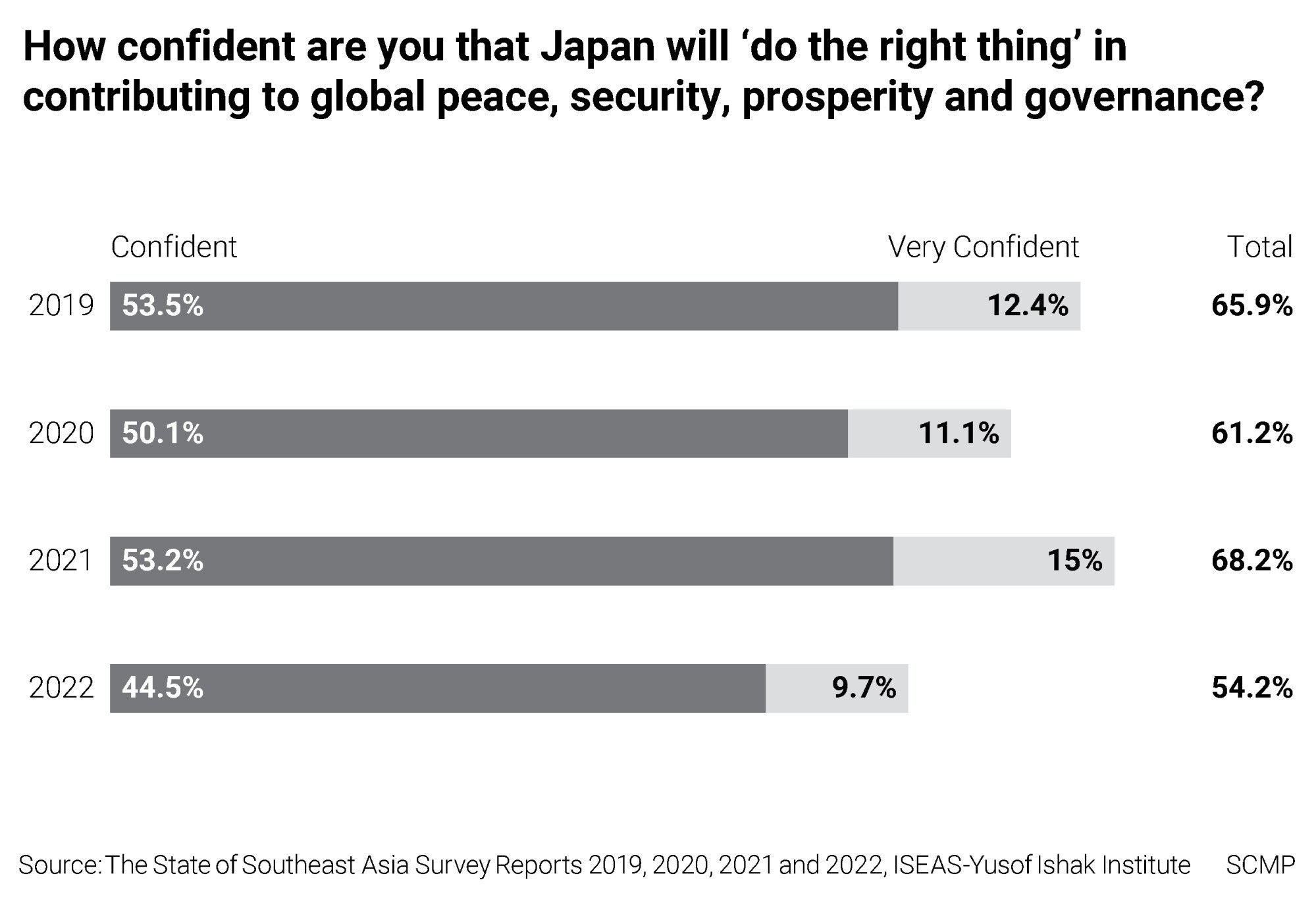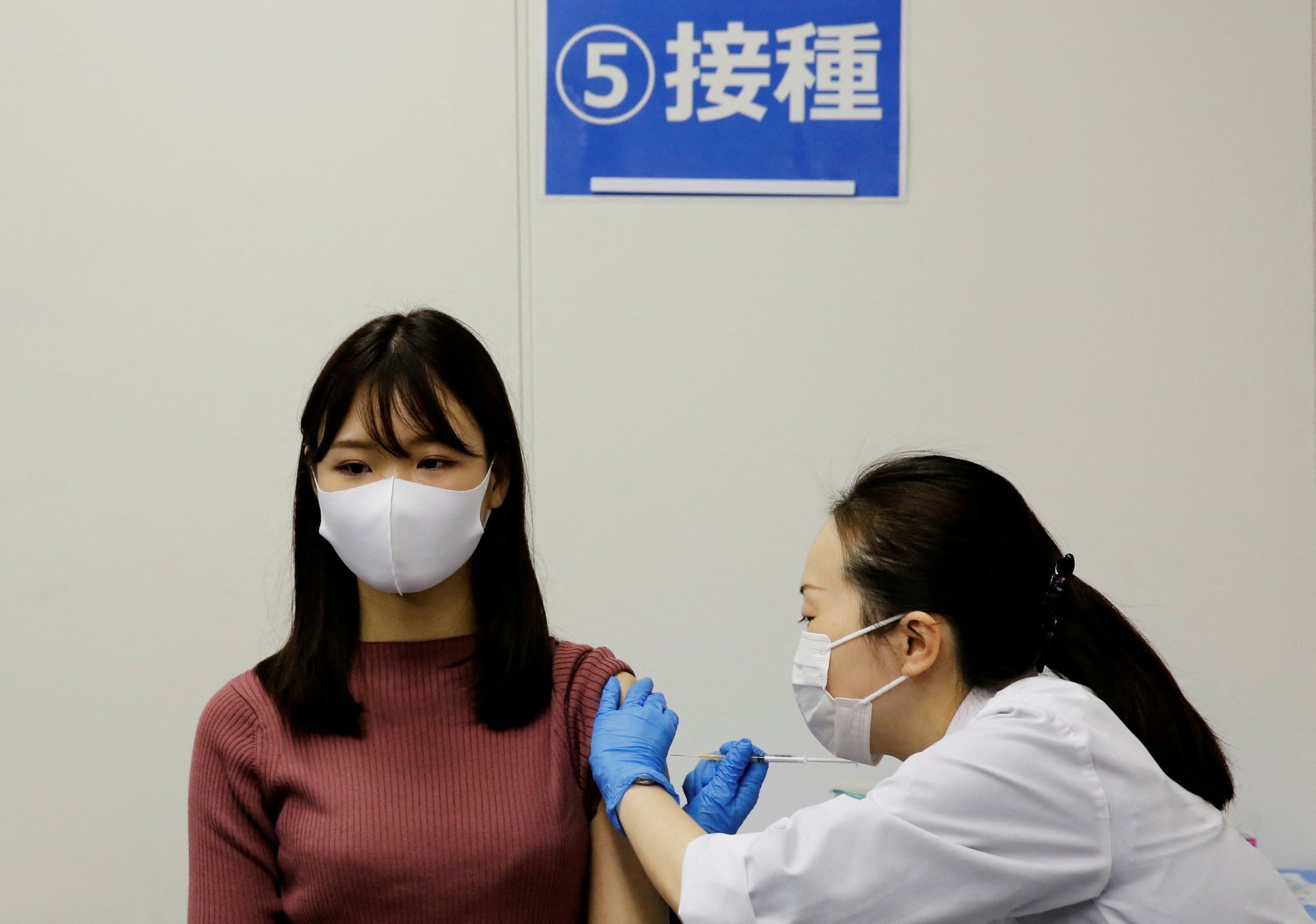
Japan beats China as an investor in Asean but why does survey show trust in it is declining?
- Singapore think tank survey finds dip in confidence in Japan, even though it is Southeast Asia’s larger investor, beating China
- Experts say Japan’s domestic politics, tense relations with neighbours and Covid-19 management have not inspired confidence in its global leadership
This number “declined significantly” from last year’s 68.2 per cent, the survey report said. A check of the findings from previous surveys since 2019 when the survey first began found this was the first time it fell to below 60 per cent.

When it came to assessing influence in Southeast Asia, only 2.6 per cent of respondents in this year’s survey picked Japan as the most influential economic power, down from 4.1 per cent last year.

Political scientist Chan Heng Chee, Singapore’s former ambassador to the US, said Japan’s initial handling of the pandemic in 2020 was seen as “bumbling”.
“And also because it was not forthcoming in providing vaccines,” Chan said, noting that while survey results had shown 57.8 per cent of people in Asean saw China as providing more vaccine support, only 4.1 per cent thought the same of Japan.
“In the past Japan had been at the forefront of giving economic and humanitarian assistance, so trust declines,”
“In the past Japan had been at the forefront of giving economic and humanitarian assistance, so trust declines,” Chan said, adding the pandemic’s impact on health and the economy were the greatest challenges faced by Southeast Asian countries.
Kei Koga, an assistant professor at Nanyang Technological University in Singapore, pointed to leadership turnover as a reason.

Sharon Seah, a senior fellow at the ISEAS-Yusof Ishak Institute and lead author of the report said that since ex-prime minister Suga’s visit to Vietnam and Indonesia in 2020, no Japanese leader has visited Southeast Asia.
“Perhaps it is time for Kishida to take a tour of the region once Japan lifts its border restrictions,” Seah added.
Which countries have the most trust in Japan?
The survey found the largest swing came from Cambodian respondents, where only 32.1 per cent said they trusted Japan in this year’s survey, compared to 84.6 per cent in 2021.
Revised Japan-Asean free trade deal goes halfway into effect
This, according to Zha Daojiong, an international studies professor at China’s Peking University, reflects Southeast Asian countries’ concerns “about the level of alignment between Tokyo and Washington on geostrategic matters”.
Huynh Tam Sang, a lecturer at Ho Chi Minh City University of Social Sciences and Humanities in Vietnam said that Tokyo’s efforts in bolstering a coalition with the US and Australia has “weakened Tokyo’s neutrality”.
“[It has] made Japan less appealing for those seeking to hedge against the danger of the US-China strategic rivalry,” Huynh said, adding that Kishida’s policy on promoting engagement with Southeast Asian countries still remains unclear.

Before the pandemic, Japan pledged in 2019 to double development efforts with Asean countries through investments, loans and projects, and even strengthen defence cooperation through the Vientiane Vision 2.0, a defence initiative for Southeast Asian states.
“Seeking closer ties with the US and approving record defence spending amid China’s expansion are notable instances. But [these] are not enough for Asean states to rely on Japan,” Huynh added.
But Tomoo Kikuchi, an associate professor from Waseda University said he believed “some of the scores will improve again in the post-pandemic world.”
“Japan will hopefully be able to provide solutions to many of the challenges that Asean faces such as climate-change related issues, supply chain resilience, regional infrastructure, and the digital economy,” Kikuchi added.
Kishida vows to deepen Japan-Asean ties amid China’s assertiveness
Pointing out that Southeast Asia’s declining confidence in Japan could undermine Tokyo’s efforts in engaging with the region, Huynh said that the Kishida administration should foster greater people-to-people ties to “counterbalance China’s growing assertiveness”
Rifki Dermawan, an international relations lecturer at Indonesia’s Andalas University in West Sumatra said that unlike China which has been conducting vaccine diplomacy and the US which has dispatched senior administration officials to the region, few high-profile events were linked to Japan.
Citing US Secretary of State Antony Blinken’s speech at the University of Indonesia and discussion with youth in December, Dermawan said these are “good strategies to engage with common people and gain trust from them.”

